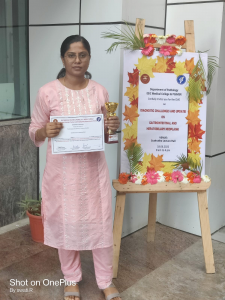
The Department of Pathology, Vydehi Institute of Medical Sciences & research Centre, Bengaluru provides both, laboratory services to in-patients and out-patients; and academic activities in the form of teaching of undergraduate students of medical, dental, nursing and paramedical courses and also postgraduate students in Pathology, Nursing and other medical courses.
Teaching facilities
Undergraduate teaching for
Postgraduate teaching in
Undergraduate and postgraduate teachings are through a customized program of theory lectures, tutorial classes and practical classes. Periodic theory and practical internal assessments are conducted and student performance monitored. The department maintains and regularly upgrades teaching material for these students – these are in the form of anatomic, pathologic specimens, microscopic slides, wall mounted charts, hand-outs and MS PowerPoint presentations.
The departmental museum houses in excess of 470 specimens, along with corresponding catalogues for student perusal. The specimens are constantly upgraded with assistance from the museum curator. A separate set of Unmounted specimens are available exclusively for MD Pathology training and evaluation.
Postgraduate training sessions for MD Pathology course are held on a regular basis. Weekly sessions include subject seminars, journal clubs, interesting case discussion, KCIAPM and EQAS slide discussion, Dissertation reviews and slide reviews, along with informal discussions of cases on a daily basis. Students are rotated through the sections- Haematology, Blood Bank, Cytology and Histopathology (including Neuropathology and Oncopathology) to maximize exposure. Also the students are posted to other departments like Biochemistry, Microbiology and Forensic medicine. District residency program (DRP) postings are also there where post graduates are posted in KR Puram General Hospital, Namma Clinic and KC General Hospital for General OPD services and critical care medicine. Periodic internal assessments in theory and practical are held, so also day-to-day monitoring of work performance. Postgraduate students have access to over 151 books in the departmental library and more than 300 e-books collected by the staff. It is ensured that the students regularly attend as well as present posters and oral papers in the CME and Conferences. Postgraduate students in other specialty are also provided with introductory and course-oriented programs in the fields of Histopathology, Cytology and Haematology Blood bank.
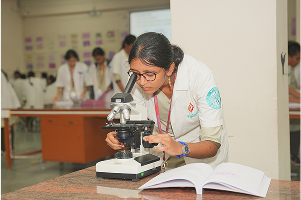
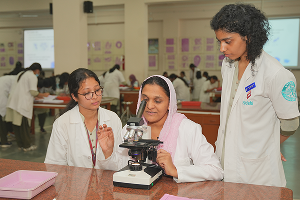
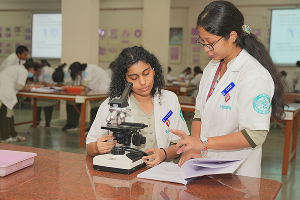
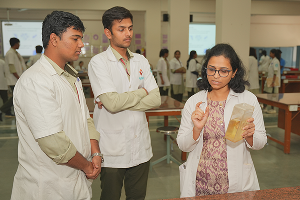
VYDEHI INSTITUTE OF MEDICAL SCIENCES & RESEARCH CENTRE, BANGALORE
DEPARTMENT OF PATHOLOGY
LIST OF FULL TIME TEACHING FACULTIES
Month and Year of submission of details : 05.02.2026(5th February 2026)
| SL No | Faculty Name | AEBAS Attend ID | Medical Registration No | Professional Qualification(s) | Department | Designation | Nature of Employment | Total Teaching Exp |
|---|---|---|---|---|---|---|---|---|
| 1 | Dr. Prathima S | 25485884 | 71151 | MBBS, MD | Pathology | Professor & HOD | Permanent | 19 Years 6 Months |
| 2 | Dr. Shilpa L | 34685640 | 69472 | MBBS, MD | Pathology | Professor | Permanent | 16 Years 6 Months |
| 3 | Dr. Radha R K | 30221187 | 52376 | MBBS, DCP, MD | Pathology | Professor | Permanent | 16 Years 5 Months |
| 4 | Dr. Shailaja Kupati | 29852762 | 86616 | MBBS, MD | Pathology | Associate Professor | Permanent | 10 Years 9 Months |
| 5 | Dr. Divya N | 89884432 | 106467 | MBBS, MD | Pathology | Associate Professor | Permanent | 9 Years 6 Months |
| 6 | Dr. Hemanthkumar V M | 43818216 | 89653 | MBBS, MD | Pathology | Associate Professor | Permanent | 8 Years 11 Months |
| 7 | Dr. Kavya N | 99618413 | 109226 | MBBS, MD | Pathology | Assistant Professor | Permanent | 8 Years 0 Months |
| 8 | Dr. Rohini Dhanya C S | 34814194 | 71644 | MBBS, Diploma, MD | Pathology | Assistant Professor | Permanent | 13 Years 5 Months |
| 9 | Dr. Devasmita Gain | 84146102 | 104829 | MBBS, MD | Pathology | Assistant Professor | Permanent | 6 Years 5 Months |
| 10 | Dr. Varsha U Reddy | 56896589 | 125551 | MBBS, MD | Pathology | Assistant Professor | Permanent | 5 Years 2 Months |
| 11 | Dr. Sandhya N | 96000855 | 129747 | MBBS, MD | Pathology | Assistant Professor | Permanent | 4 Years 11 Months |
| 12 | Dr. Sameena E | 47665480 | KRL 2013 0000689 KTK | MBBS, MD | Pathology | Assistant Professor | Permanent | 5 Years 5 Months |
| 13 | Dr. Gaurav Chaudhary | 75281635 | DLH 2019 00000646 KTK | MBBS, Diploma | Pathology | Senior Resident | Permanent | 11 Years 7 Months |
| 14 | Dr. Vijaya Pandey | 16584520 | 167857 | MBBS, DNB | Pathology | Senior Resident | Permanent | 4 Years 11 Months |
| 15 | Dr. Manasa Reddy Katta | 61110308 | 100870 | MBBS, MD | Pathology | Senior Resident | Permanent | 4 Years 0 Months |
| 16 | Dr. Kaushiki Varshney | 45332499 | 171089 | MBBS, MD | Pathology | Senior Resident | Permanent | 3 Years 11 Months |
| 17 | Dr. Gudi Himbindu | 81292634 | 183155 | MBBS, MD | Pathology | Senior Resident | Permanent | 3 Years 10 Months |
| 18 | Dr. Pruthvi H | 65645524 | 134636 | MBBS, MD | Pathology | Senior Resident | Permanent | 3 Years 11 Months |
| 19 | Dr. Afsal Ahamed K | 84675172 | 153897 | MBBS | Pathology | Tutor | Permanent | 2 Years 3 Months |
| 20 | Dr. Rathulya Gloria Sajimon | 95521339 | 169528 | MBBS | Pathology | Tutor | Permanent | 2 Years 3 Months |
| 21 | Dr. Soumya Agarwal | 79140358 | 169849 | MBBS | Pathology | Tutor | Permanent | 2 Years 3 Months |
| 22 | Dr. Sukanya Bora | 68238383 | 165656 | MBBS | Pathology | Tutor | Permanent | 2 Years 3 Months |
| 23 | Dr. Charitha B | 83168876 | 160625 | MBBS | Pathology | Tutor | Permanent | 1 Years 2 Months |
| 24 | Dr. Sneha R | 39087456 | 163961 | MBBS | Pathology | Tutor | Permanent | 1 Years 1 Months |
| 25 | Dr. Ravi S | 70561914 | 131306 | MBBS | Pathology | Tutor | Permanent | 1 Years 0 Months |
| 26 | Dr. N S Lohit | 72407485 | 146052 | MBBS | Pathology | Tutor | Permanent | 1 Years 0 Months |
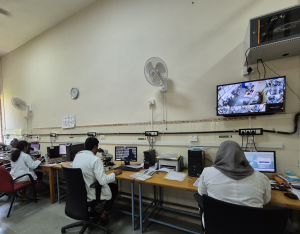
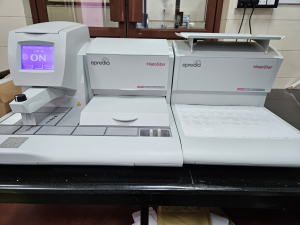
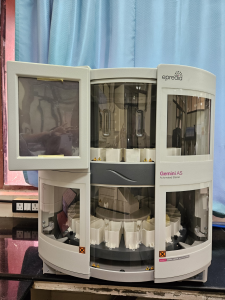
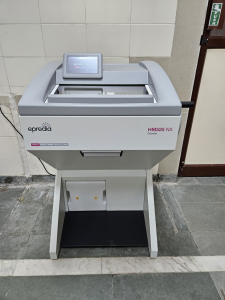




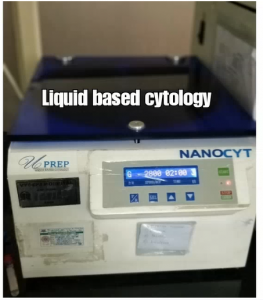


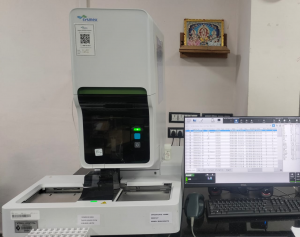






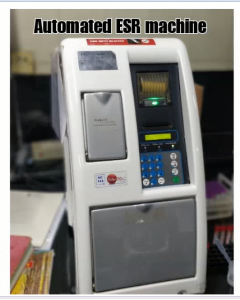
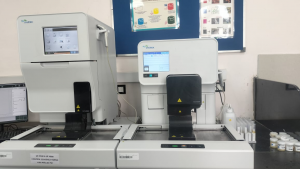
Central Museum
Departmental Museum
| HISTOPATHOLOGY NEW | |||
|---|---|---|---|
| Sl.No | Name of Equipment | Serial No | model/Make/Year of Make |
| 1. | Autostainer | GT7843H2308EP | GEMINI AS |
| 2. | Embedding Station | HS3808A2308EP | EPREDIA |
| 3. | Cold Plate | HS3795B2308EP | EPREDIA |
| 4. | Cryostat | S23020431EP | HM 525NX UV |
| 5. | Centrifuge | 2JLN41076 | R.8plus /21278-1Transcal |
| DEPARTMENT OF HAEMATOLOGY | ||||
|---|---|---|---|---|
| S.NO | INSTRUMENT NAME | MAKE | SERIAL NO | VYDEHI NO |
| 1 | SYSMEX XN 1000-1 | SYSMEX | 51509 | VH-3004 |
| 2 | SYSMEX XN 1000-2 | SYSMEX | 51510 | VH-3005 |
| 3 | SYSMEX UF 4000 | SYSMEX | 26673 | |
| 4 | SYSMEX UC-3500 | SYSMEX | 13137 | |
| Sl. No. | Name of the faculty | Title of the paper | Whether Published in International/ National State/ Institutional Journals | Citation of the journal | Details Of indexing | Date of Publication | Page No: Volume ISSN No: |
|---|---|---|---|---|---|---|---|
| 1 | Radha.R.K Safeena Taskin Prathima S | Cytological evaluation of neck lymphnodes for metastatic disease | Global journal for research analysis | Cytological evaluation of neck lymphnodes for metastaic disease. Radha.R.K, Safeena T , Prathima S. Global journal for research analysi volume II Issue -1 jan 2022 | Indian citex Index Index Copernicus Google Scholar EBSCO Citex medicus | 2022 vol 11 issue 01 jan-3 | ISSN no2277-8160 DOI 10.36106/gjra |
| 2 | Nivedita S Radha R.K, Prathima S | Incidental findings of liver disease A study inTertiary care center | Indian journal of Forensic medicine and pathology National Journal | Nivedita S, Radha R.K, Prathima S. Incidental findings of liver disease. A study inTertiary care center. Indian Journal of Forensic Med pathol 2022:15 (4);243-247 | Scopus Index Copernicus Google Scholar EBSCO, International scientific index | 2022 Vol 15 (4) October-december- page no
| 10.2108:IJFMP 0947.3383.154226 DOI:http://dx.doi.org/10.21088/ijfmp. |
| 3 | Syeda Husnian fathima, Gayathri T, Shailaja k, Shashikala V Prathima S. | Histopathological Spectrum of Pulmonary Lesions in Autopsies- A Two Year Retrospective Study | Indian Journal of Forensic Medicine and Pathology National Journal
| Syeda husnian F,Gayathri T ,shailaja k,Shashikala V Prathima S Incidental findings of liver disease A study at inTertiary care centerndian Journal of Forensic Med pathol 2022:15 (4);275-279 | Scopus
| DOI:http://dx.doi.org/10.21088/ijfmp. 2022 Vol 15 (4)
| October-december-10.2108:IJFMP 0947.3383.154226
|
| 4 | Sai Thanmaye, Shubham Gupta, Salman Kurshid, Gayathri T | BIRADS Lexicon and its Histopathological Corroboration in the Diagnosis of Breast Lesions | International Journal of Innovative Science and Research Technology | Sai Thanmaye, Shubham Gupta, Salman Kurshid, Gayathri, IJISRT, Volume 7, Issue 6, June – 2022 | Pubmed | June 2022 | Volume 7, Issue 6, pg 73-79ISSN No:-2456-2165 |
| 5 | Prathima S, Gayathri T | XanthogranulomatousOophoritis- A master disguise | International Journal of Scientific Research National journal | Prathima S Gayathri T XANTHOGRANULOMATOUS OOPHORITIS: A MASTER DISGUISE!Volume – 12 | Issue – 09 | September – 2023 | PRINT ISSN No. 2277 – 8179 | DOI : 10.36106/ijsr | National Journal | September 2023 | Volume 12, Issue 9, Pg 2277/8179 DOI 10.36106 IJSR |
| 6 | Deepa J, Prathima S., | Histopathological Spectrum of skin lesions in a tertiary care centre. | International Journal of Science and Research National Journal | Deepa J., Prathima S., “Histopathological Spectrum of Skin Lesions in a Tertiary Care Centre”, International Journal of Science and Research (IJSR), Volume 13 Issue 2, February 2024, pp. 1853-1856, | Google Scholar | Volume 13 issue to Feb 2024
| ISSM 2319-7064 SJIF(2022) 7.942 |
| 7 | Tirupati S, Puthenveetil P, Lakkundi S
| High Malignancy Risk and its Predictors in South Indian Patients with Bethesda II Thyroid Nodules | Cureus International journal
| Tirupati S, Puthenveetil P, Lakkundi S, et al. (February 26, 2024) High Malignancy Risk and Its Predictors in South Indian Patients With Bethesda II Thyroid Nodules. Cureus 16(2): e54923. doi:10.7759/cureus.54923 | Pubmed | Feb2024 | Journa DOI 10.779/ CUREUS |
| 8 | Naga Nitin L T, Shilpa Lakkundi Sagar Reddy S.L
| High Diagnostic Accuracy of Thyroid stimulationghormone(TSH) Receptor antibodies in distinguishing Graves Disease and subacute Thyrotoxicosis in the Indian population | Cureus International Journal | Naga Nitin L T, Lakkundi S, S L S, et al. (February 16, 2024) High Diagnostic Accuracy of Thyroid-Stimulating Hormone (TSH) Receptor Antibodies in Distinguishing Graves’ Disease and Subacute Thyrotoxicosis in the Indian Population. Cureus 16(2): e54303. doi:10.7759/cureus.54303 | pubmed
| Cureus 16 (e54303 DOI 10.7754/cureus54343) | DOI 10.7754/cureus54343 |
| 9 | Radha R.K, Prathima S | Histopathological Spectrum of Kidney Lesions in an Autopsy 2 years study at Tertiary Care Hospital.. | Indian Journal of Forensic Medicine and Pathology National Journal | Radha R.K, Prathima S Histopathological Spectrum of Kidney Lesions in an Autopsy 2 years study at Tertiary Care Hospital ndian Journal of Forensic Med pathol 2024 :17 (1);19-23 | Scopus | 2024 Vol 17 (1) January-March- Page no 19-23, 0974.3383.17124.3 | DOI:http://dx.doi.org/10.21088/ijfmp.
|
| 10 | Dr. Swati R., Dr. Gayathri T., Dr. Kavya N., Dr. Prathima S. | . An Unusual Case Report- An Adult OF Chronic Myeloid Leukemia presenting as Acute Myeloid Leukemia M7(Megakarocytic Blast Crisis) | International Journal of Science and Research National journal | Dr. Swati R., Dr. Gayathri T., Dr. Kavya N., Dr. Prathima S., “An Unusual Case Report – An Adult of Chronic Myeloid Leukemia Presenting as Acute Myeloid Leukemia M7 (Megakaryocytic Blast Crisis)”, International Journal of Science and Research (IJSR), Volume 13 Issue 2, February 2024, pp. 281-284. | www.ijsr.net Google scholar | Volume 13 issue 2 Feb 2024
| Doi http:// dx.doi.org10./10.21275/SR24201183620 |
| 11 | Divya Nagaram, Devasmita Gain, Kavya Nagesh N. Thamara,
| Integration of biomarkers, sonographic findings, frozen section with histological analysis in ovarian neoplasms; a tertiary care center perspective
| Reserch journal of medical sciences International | Divya Nagaram, Devasmita Gain, Kavya Nagesh and N. Thamarai Selvi, 2024. Integration of Biomarkers, Sonographical Findings, Frozen Section with Histopathological Analysis in Ovarian Neoplasms: A Tertiary Care Center Perspective. Res. J. Med. Sci., 18: 353‐358, doi: 10.36478/makrjms.2024.11.353.358 | Embase | 28th october 2024 | 1993-6095Res.J.Med.Sci.,2024,18(11):353-358
|
| 12 | N. Thamarai Selvi, N. Sundhar Rajan, N. Kavya K. Sunitha,
| ASpectrum of chronic granulomatous lesions of skin. A 10 years study from tertiary peripheral center of south India | Reserch journal of edical sciences International | N. Thamarai Selvi, N. Sundhar Rajan, N. Kavya and K. Sunitha, 2024. Spectrum of Chronic Granulomatous Lesions of Skin: A 10‐Year Study from a Tertiary Referral Centre of South India. Res. J. Med. Sci., 18: 533‐537, doi: 10.36478/makrjms.2024.9.533.537 | Embase | 28th August 2024 | 1993-6095 Res.J.Med.Sci.2024,18(11):533-537
|
| 13 | N. Thamarai Selvi, N. Sundhar Rajan, D.H. Gopalan K. Sunitha, | Assessment of knowledge attitude and practices reguarding role of artificial intelligence in medicine among undergraduate medical students in a tertiary care teaching hospital N. Thamarai selvi ,K. Sunitha, N .Sundaran Rajan, D.H Gopalan
| Reserch journal of medical sciences International | N. Thamarai Selvi, N. Sundhar Rajan, D.H. Gopalan and K. Sunitha, 2024. Assessment of Knowledge, Attitude and Practices Regarding Role of Artificial Intelligence in Medicine among Undergraduate Medical Students in a Tertiary Care Teaching Hospital. Res. J. Med. Sci., 18: 519‐525, doi: 10.36478/makrjms.2024.9.519.525 | Embase
| 28th August 2024 | 1993-6095 Res.J.Med.Sci.,2024,18(11):519-525
|
| 14 | Catherine Aishwarya, N. Divya, N. Kavya, R.K. Radha, S. Prathima | Papinocoulo society of pathology system VS world health organisation of repoting system for pancreatocobiliary cytopathologyb-comparison of risk of malinancy and Disgnostic predictive value for A 3 year Retrospective study | Resrch journal of edical sciences International | Catherine Aishwarya, N. Divya, N. Kavya, R.K. Radha, S.Prathima and JaydeepGearhalliLakshmipathy, 2024. Papanicolaou Society of Cytopathology System vs World Health Organization of Reporting System for Pancreaticobiliary Cytopathology‐Comparison of Risk of Malignancy and Diagnostic Predictive Values: A 3 Year Retrospective Study in India. Res. J. Med. Sci., 18: 512‐517, doi: 10.36478/makrjms.2024.12.512.517 | Embase | Published on 5 December 2024 | ISSN1993-6095 Vol 18 no 12 DOI:10.36478 makrjms2024.12.512.517
|
| 15 | Safina Taskeen, V. Shashikala, R.K. Radha M. Manikya, | The diagnostic Accuracy of Intraoperative Frozen section to Routine Paraffin section .A comparative Study | Resrch journal of Medical sceiences International | Safina Taskeen, V. Shashikala, R.K. Radha and M. Manikya, 2025. The DiagnosticAccuracy of Intraoperative Frozen Section to Routine Paraffin Section:A Comparative Study. Res. J. Med.Sci., 19: 370‐373, doi: 10.36478/ makrjms.2025.1.370.373 | Embase | Published on 28 December 2024 | ISSN1993-6095 vol 19 no 1 DOI:10.36478 makrjms2024.12.512.517 |
| 16 | Nitesh, A., Nandennavar, M., Karpurmath, S. V., Kupati, S | A Small case series of primary synovial sarcoma of lung | Nitesh, A., Nandennavar, M., Karpurmath, S. V., & Kupati, S. (2024). A small case series of primary synovial sarcoma of lung. International Journal of Research in Medical Sciences, 12(11), 4230–4234. | International | Pubmed &PMC | 30/10/2024 Page no-4230-4234 Volume-12
| https://doi.org/10.18203/2320-6012.ijrms20243374 |
Modified time table and curriculum is being followed as per the New CBME guidelines. AETCOM sessions of second year and whenever required in other years are also there. Electives in the department are being planned for interested students.
Goal
The broad goal of the teaching of undergraduate student in Pathology is to provide the students with a comprehensive knowledge of the mechanisms and causes of disease, in order to enable him/her to achieve complete understanding of the natural history and clinical manifestations of disease.
Knowledge
At the end of the course, the student should be able to :
Skills
At the end of the course, the student should be able to:
Integration
At the end of training he/she should be able to integrate the causes of disease and relationship of different etiological factors (social, economic and environmental) that contribute to the natural history of diseases most prevalent in India.
Academic Milestones
Academic activities
The 32nd Annual State Conference of KCIAPM – Karnataka Chapter was organized in association with the Department of Pathology at VIMS & RC ON 29th, 30th and 31st of October, 2004.
Projects Current and Completed
Completed the project:
RESEARCH PROJECT – ICMR –NCDIR- 2019-2024
Completed research in 2024 February Indian council of medical research-National centre for disease inormatics and research ICMR -NCDIR
Incidental Gallbladder cancer and other premalignant gall bladder conditions in India towards early detection of gallbladder cancer 2019 -2024 -5 year study IN VIMS&RC as Co-researcher Dr. Radha.R.K. Associate Professor along with Dr Ganesh Professor and HOD Oncology under the Guidance.
Professor Dr Prasenjit Das AIIMS New Delhi Co-investigator: Dr Radha.R.K. K Professor, Dr Kavya Assistant professor
On-going Projects:
PG Dissertation
PG THESIS On going
UG Projects
Student: Akansha swain (2ND YEAR MBBS)
Guide: Dr Radha R K
Student: A Sai Thanmaye (2nd year, MBBS)
Guide: Dr. Gayathri T
Student: Akansha Rao (2nd yr. MBBS)
Guide: Dr Shailaja K
Student: Nitya R (2nd yr. MBBS)
Guide: Dr Prathima S
Student: Dr Shwetha Ramesh
Guide: Dr Sumana B S
Student: Nitya Menon
Guide: Dr Shilpa L
Student: Vasudha
Guide: Dr Shilpa L
Student: Vasudha
Guide: Dr Shilpa L
Central Diagnostic Laboratory (CDL) is accredited by National Accreditation Board for Testing and Calibration Laboratories (NABL).
| Sl.No. | Faculty Name | Date of Award | Awarding Agency/ Society | Area of contributions | National/International/ State etc., |
|---|---|---|---|---|---|
| 1. | Dr. Sumedha Vats | 2012 | KCIAPM | 3rd place for her poster presentation on ‘Giant cellular Thymolipoma’ in the Annual state conference of KCIAPM in 2012. | State Association |
| 2. | Dr. Shefali H. Karve | 2014 | KCIAPM | Best paper presentation: Her-2-neu overexpression in colorectal carcinoma. | State Association |
| 3. | Dr. Nimisha G, | 2018 | KCIAPM | 2nd position for her oral paper presentation on ‘Study of radio logically assisted fine needle aspiration cytology in abdominopelvic lesions’ at state conference of KCIAPM in 2018. | State Association |
| 4. | Dr. Shailaja Kupati, | 2018 | KCIAPM | Oral presentation among top 5 at the KCIAPM conference, Bangalore in the year 2018. | State Association |
| 5. | Mrs. Premalatha, Senior Technician, | 2019 | Beckman coulter | Won 1st prize in quiz conducted for Technicians during the CME on ‘Hematology update’ by Beckmann Coulter at Columbia Asia Hospital, Yeswanthpur, and Bangalore on 25th April, 2019. | International |
| 6. | Dr. Supriya Tiwari, | 2019 | KCIAPM | As Social Media Committee member with KCIAPM at the state conference conducted at Bagalkot in the month of September, 2019. | State Association |
| 7. | Dr. Kavya and Dr. Keerthy | Jan-20 | ESIC Med college | Second prize in 9TH ANNUAL KCIPAM POST GRADUATE QUIZ conducted in ESIC Medical collage Bangalore on 31st JAN2020. | National |
| 8. | Dr. Shailaja K. | 2021 | KCIAPM | Session topper award in the state KCIAPM conference in 2021 for Oral paper | State Association |
| 9. | Dr. Keerthy Sudha | Jul-21 | RGUHS | 5th Rank in the MD Pathology exams in the exams conducted in July 2021 | State Rank |
| 10. | Dr. Keerthy and Dr. Shruthi. | 2020 | Sri Ramachandra University | 1st prize in the quiz conducted by SPARC, Sri Ramachandra University in 2020. | National |
| 11. | Dr. Swathi R | 2022 | ESIC Medical College & PGIMSR | 2nd place for her poster presentation: Ig G4 related disease: Chennai | National |
| Sl. No | 1st year 2019 | 2nd year 2020 | 3rd year 2021 |
|---|---|---|---|
| 1. | 02 | 02 | 02 |
| SNo | Authors | Topic | Conference |
|---|---|---|---|
| 1 | Dr. Sumana B.S | Unusual pathologic presentation of functional parathyroid adenoma – study of 4 cases | 41st Annual KCIAPM conference, September 2014, Bangalore |
| 2 | Dr. Kiran Verma, Dr. Shivarudrappa | Poster Presentation: A case of ambiguous genitalia with benign mature teratoma of ovary | IAC KCCON, Feb 2015, Bellary |
| 3 | Dr. Rashmi G. S. Basvaraj, Dr. C. J. Prakash | Poster presentation: Cytology of conjunctival nodule diagnosed as Mantle cell lymphoma – a rare case | IAC KCCON, Feb 2015, Bellary |
| 4 | Dr. Prasit Kumar Ghosh, Dr. Indu M | Poster presentation: Malakoplakia of the urachus- masquerading as malignancy | 33rd Annual National CME in Pathology, June 2015, Belagavi |
| 5 | Dr. Tejshee Bhushan, Dr. Rekha Singh, Dr. C. J. Prakash | Poster presentation: A rare case of primary leiomyosarcoma of larynx | 33rd Annual National CME in Pathology, June 2015, Belagavi |
| 6 | Dr. Prathima S | Paper Presentation: Impact of the Bethesda System of reporting Thyroid cytopathology | International conference in male genitourinary pathology, July 2015, Bangalore |
| 7 | Dr. Manasa Reddy K, Dr. A.S Shivarudrappa | Poster presentation: Sub ependymal giant cell astrocytoma in tuberous sclerosis | International conference in male genitourinary pathology, July 2015, Bangalore |
| 8 | Dr. Arpita Singh Dr. Indu M | Poster presentation: A rare case of acute erythroid leukaemia in a female patient | International conference in male genitourinary pathology, July 2015, Bangalore |
| 9 | Dr. Ankita Mehta, Dr. Rojaramani, Dr. Prathima S, Dr. C.J. Prakash | Poster presentation: Ovarian Squamous cell carcinoma arising from mature cystic teratoma – a rare entity | International conference in male genitourinary pathology, July 2015, Bangalore |
| 10 | Dr. Manasa Reddy K, Dr. A.S. Shivarudrappa, Dr. C.J Prakash | Paper Presentation: Spectrum of gastrointestinal malignancies in Vydehi Institute of Medical Sciences and Research Centre | 42nd Annual KCIAPM Conference, September 2015, Mangalore |
| 11 | Dr. Rashmi G. S. Basvaraj, Dr. A.S. Shivarudrappa | Paper Presentation: Correlation of bone marrow aspirate and biopsy findings in diagnosis of haematological disorders – a study of 100 cases | 42nd Annual KCIAPM Conference, September 2015, Mangalore |
| 12 | Dr. Kiran Verma, Dr. A.S. Shivarudrappa | Paper Presentation: A correlation study of FNAC and histopathology in 100 cases of thyroid | 42nd Annual KCIAPM Conference, September 2015, Mangalore |
| 13 | Dr. Rishiraj Baruah, Dr. Sumana B.S, Dr. A.S. Shivarudrappa | Poster Presentation: Sebaceous carcinoma of the eyelid – a complex entity | AIICME, Jan 2016, Bhubaneswar |
| 14 | Dr. Angkita Kalita, Dr. Prathima S | Paper Presentation: Diagnostic utility of FNAC in intra-abdominal lesions | CYTOCON, Jan 2016, Mysore |
| 15 | Dr. Prasit Kumar Ghosh, Dr. Sumana B.S, Dr. A.S. Shivarudrappa | Paper Presentation: Diagnostic accuracy of the Bethesda system for reporting thyroid cytological aspirates with histopathological correlation – one year study | International CME in Pathology, Feb 2016, Goa |
| 16 | Dr. Tejshee Bhushan, Dr. Sumana B.S, Dr. A.S. Shivarudrappa | Paper Presentation: Correlation between prostate specific antigen and prostate pathology | International CME in Pathology, Feb 2016, Goa |
| 17 | Dr. Ankita Mehta, Dr. Prathima S | Paper Presentation: Diagnostic efficacy of fine needle aspiration cytology of lymphadenopathy with histopathological correlation | International CME in Pathology, Feb 2016, Goa |
| 18 | Dr. Angkita Kalita, Dr. Prathima S, Dr. Shivarudrappa A S | Diagnostic accuracy of Fine Needle Aspiration Cytology in valuation of intraabdominal lesions. | |
| 19 | Dr. K Jaya Swathi, Dr. Sumana B S, Dr. Shivarudrappa A S | Spectrum of lesions detected by fine needle aspiration cytology in head and neck lesions. | International CME in Pathology, Histopathology and Cytology 2018, February, Goa |
| 20 | Dr. Anusha K, Dr. Niranjan J, Dr. Shivarudrappa A S | Histopathological spectrum of Periampullary lesions. | |
| 21 | Dr. Spoorthi,, Dr. Cheena Garg, Dr. Shivarudrappa A S | Spectrum of non-haematological paediatric tumours in a tertiary care centre. | International Conference of Paediatric Pathology, BMC RJ, 27th& 28th April 2018. |
| 22 | Dr. Sameeranandan Reddy, Dr. Vidya K, Dr. Shivarudrappa A S | Diagnostic correlation of ovarian neoplasms by frozen section and paraffin section. | National CME in Pathology , Karpaga Vinayaga medical college, Kanchipuram, Nov 2018 |
| 23 | Dr. Anita, Dr. Prathima S, Dr. Shivarudrappa A S | Cyto-morphological spectrum of space occupying lesions of liver | IAC- KCCON, SDUMC, Kolar, February 2018 |
| 24 | Dr. Harini V R, Dr. Sumana B S, Dr. Shivarudrappa A S | Significance of modified Masood’s scoring system in cytological diagnosis of palpable breast lumps. | IAC KC-CON 2018 March 2nd& 3rd 2018 |
| 25 | Dr. Khushboo Saran, Dr. Vidya K, Dr. Shivarudrappa A S | Histomorphological spectrum of transbronchial biopsy of lung. | |
| 26 | Dr. Vishnupriya, Dr. Vidya K, Dr. Prathima S | Histomorphological spectrum of meningiomas: a Retrospective study. | International conference on Dermatopathology and soft tissue tumor, MVJ medical College, March 2019 |
| 27 | Dr. Nimisha G, Dr. Prathima S | Study of radio logically assisted fine needle aspiration cytology in abdominopelvic lesions. | |
| 28 | Dr. Kavya, Dr. Sumana B S | Histopathological spectrum of Non neoplastic lesions of upper GI endoscopy | International conference on Dermatopathology and soft tissue tumour, MVJ medical College, March 2019 |
| 29 | Dr. Tarun Mittal, Dr. Niranjan J, Dr. Shivarudrappa A S | Histopathological spectrum of neoplastic lesions of upper GI endoscopy | International conference on Dermatopathology and soft tissue tumour, MVJ medical College, March 2019 |
| 30 | Dr. Angkita Kalita, Dr. Prathima S, Dr. Shivarudrappa A S | Adrenal Myelolipoma: An uncommon Benign Neoplam. | |
| 31 | Dr. K Jaya Swathi, Dr. Sumana B S, Dr. Shivarudrappa A S | Unexpected and sudden death due to colloid cyst of the third ventricle in young male. | NPSICON April 2017, NIMHANS, Bangalore |
| 32 | Dr. Anusha K, Dr. Niranjan J, Dr. Shivarudrappa A S | A case of cervical leiomyoma in young female. | Golden Jubilee CME, 14th& 15th July 2016, St John’s Medical College, Bangalore, |
| 33 | Dr. Spoorthi, Dr. Shivarudrappa A S | A rare case presentation of Angiomyomatous hamartoma of inguinal lymphnodes. | Golden Jubilee CME, 14th& 15th July 2016, St John’s Medical College, Bangalore, |
| 34 | Dr. Harini, Dr. Sumana B S, Dr. Shivarudrappa A S | Diagnostic dilemma: Transitional cell carcinoma v/s Malignant Brenner tumour Ovary. | International CME in Pathology, Histopathology and Cytology 2018, February, Goa |
| 35 | Dr Sameeranandan reddy, Dr. Niranjan J, Dr. Shivarudrappa A S | A case of solid pseudo papillary tumour of pancreas diagnosed on FNAC | IAC- KCCON, SDUMC, Kolar, February 2018. |
| 36 | Dr Anitha | Early metastasis of testicular seminoma to urinary bladder: A rare entity | Breast Cancer Conference at Bangalore Medical College 2017 |
| 37 | Dr Khusboo | A Tonsillar Cartilagenous Choriostoma | |
| 38 | Dr Nimisha | Malignant oncocytoma of parotid gland: A rare malignancy | |
| 39 | Dr Vishnupriya | Giant congenital melanocytic nevus: A rare entity. | Annual conference in JNMC, Belgaum 2018. |
| 40 | Dr. Kavya N | Mucosal Schwann cell hematoma – a rare case report | Annual conference in JNMC, Belgaum 2018. |
| 41 | Dr. Tarun Mittal, Dr. Prathima S, Dr. Niranjan J, Dr. Shivarudrappa A S | Lymphangioma of Ovary – A rare case presentation | International CME in Pathology, Histopathology and Cytology February, Goa |
| 42 | Dr. Supriya Tiwari, Dr. Prathima S, Dr. Shivarudrappa A S | Maignant Phyllodes with osteochondrosarcomatous differentiation | International conference on Dermatopathology and soft tissue tumour, MVJ medical College. March 2019 |
| 43 | Dr. Sameena E, Dr. Vidya K, Dr. Shivarudrappa A S, Dr. Niranjan J | Solitary Extra medullary Plasmacytoma as a nasal mass | International conference on Dermatopathology and soft tissue tumour, MVJ medical College. March 2019 |
| 44 | Dr. Keerthi Sudha G, Dr. Vidya K, Dr. Prathima S | Spectrum of Histo-pathological lesions in nephrectomy specimen in a tertiary care centre – A two year retrospective study | 47 th Annual conference KAPCON :October 2020 |
| 45 | Dr. Shruthi, Dr. Shilpa L, Dr. Prathima S | Histopathological spectrum of Ovarian lesions | 47 th Annual conference KAPCON :October 2020 |
| 46 | Dr. Supriya Tiwari, Dr. Prathima S | Does endometrium have an answer to infertility? | 46 th Annual conference KAPCON 2019, SNMC, Bagalkot |
| 47 | Dr. Sameena E, Dr. Shashikala V, Dr. Prathima S | Hansen’s – is it really at the verge of elimination? A study of clinical and histopathological correlation in Hansen’s disease in a tertiary care hospital, Bangalore | 46 th Annual conference KAPCON 2019, SNMC, Bagalkot |
| 48 | Dr. Keerthi Sudha G, Dr. Vidya K, Dr. Niranjan J, Dr. Shivarudrappa A S | Recurrent Rosai Dorfman Disease | CME on histotechniques and Immunohistochemistry. March 2019, Sri Jayadeva Institute Bangalore |
| 49 | Dr. Shruthi Reddy, Dr. Shashikala V, Dr. Shailaja K, Dr. Prathima S | Inguinal endometriosis- A rare entity | 2019 March, JNMC Belgaum |
| 50 | Dr. Pooja A S, Dr. Shilpa L, Dr. Sameera K, Dr. Prathima S | Plasmablastic Lymphoma – A rare aggressive tumour of the oral cavity in a seropositive patient | 47 th Annual conference KAPCON :October 2020 |
| 51 | Dr. Safina Taskeen, Dr. Radha R K, Dr. Shashikala V | Thoracic pleural endometriosis. | 47 th Annual conference KAPCON :October 2020 |
| 52 | Dr. Manikya M, Dr. Vidya K, Dr. Prathima S, Dr. Abhinay I | Intramuscular cavernous haemangioma with osseous metaplasia | 4th international paediatric and perinatal pathology conference 2020: Sri Ramachandra Medical College and Research Institute, Chennai, 6th– 8th February 2020. |
| 53 | Dr. Pooja A S, Dr. Shilpa L, Dr. Prathima S | Histopathological spectrum of mediastinal lesions in a tertiary care centre- 2 year retrospective study | 47 th Annual conference KAPCON :October 2020 |
| 54 | Dr. Safina Taskeen, Shashikala V | The diagnostic accuracy of intraoperative frozen section to routine paraffin section | 47 th Annual conference KAPCON :October 2020 |
| 55 | Dr. Manikya M, Dr. Prathima S, Dr. Bhanu Prakash | Keratitis – Ichthyosis- Deafness(KID)syndrome associated with rickets: A rare case | Christian Medical College, Vellore. January 15-16, 2021 |
| 56 | Dr. Manikya M, Dr. Prathima S | Risk stratification of patients with gastrointestinal stromal tumours by histopathological and immunohistochemical analysis | 47 th Annual conference KAPCON :October 2020 |
| 57 | Dr Aayesha S, Dr Shilpa L, Dr Shailaja K, Dr Prathima S | Infantile Hepatic Hemangioendothelioma | Diamond jubilee CME in Pathology at St. johns medical college. 9th-10th August 2023 |
| 58 | Sreekanth N L, Dr. Prathima S. | Erythema Induratum of Bazin – a rare cutaneous manifestation of TB. | 4th Annual Conference of Hyderabad Academy of Pathologists. ESIC Medical College and Hospital. March 2024 |
| 60 | . Dr Catherine A, Dr Gayathri T, Dr Shailaja K, Dr Prathima S | FIPL1-PDGFRA associated Chronic Eosinophilic Leukemia | 4th Annual Conference of Hyderabad Academy of Pathologists. ESIC Medical College and Hospital. March 202 |
